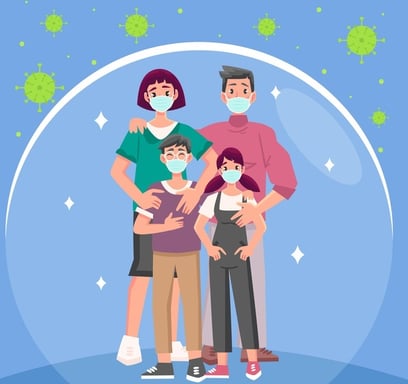

A BATTLE TO BE FOUGHT TOGETHER
Purna Dutta,
Swagat Dash Mohapatra
It’s quarantine time and every news feed, TV channel, advertisement and social media post is blaring slogans to stay home. In a pandemic such as this, isolation is the best option, but can this work in a country like India?
No one had expected such a pandemic which would devastate each corner of the world. Whereas the world was awaiting a World War III, a deadly disease, nonetheless devastating, then WW III had already been evolved, called COVID-19. Starting from the month of December, it was limited to China till end of the January. Lockdown affected the productivity of the country very much. International travel was blocked. Due to panic buying, shortage of food and groceries was also reported. Imports and exports were restricted.
It somehow reached South Korea, southeast Asian countries and Iran. Well appreciable initiatives by Korean government helped them to control the disease soon after an increment in the cases. It also spread to the United States. In America, the economic growth suddenly decreased even below that point when there was economic recession in 2008. The economy of China is expected to be decreased by 13.5% or even more than this due to shutdown of those which were developed with the progression of human civilization. In order to make successful the method of social distancing to restrict the number of COVID-19 cases, many countries started shutting down tourism, manufacturing units, film industries and other sectors.
The impact of any global disease always takes its maximum toll on the poorest, those least able to afford preventive measures and medical treatment. The economic costs from a global disease go beyond the direct damages incurred in the affected sectors of disease-inflicted countries. This is not just because the disease spreads quickly across countries through networks related to global travel, but also because any economic shock to one country is quickly spread to other countries through the increased trade and financial linkages associated with globalization. Due to lockdown, religious institutions are closed. Schools are closed. Many temples, churches, mosques offered worship via livestream amidst the pandemic. Mega sports events have been cancelled or postponed. In different countries political leaders have been sharply criticized for mishandling the situation and allowing the cases to increase.
The only silver lining amidst all this chaos, seems to be the recovery of nature. As industries, transport networks and businesses have closed down, it has brought a sudden drop in carbon emissions. Compared with this time last year, levels of pollution in New York reduced by nearly 50% due to measures taken to contain the virus. In China, emissions fell by 25% at the start of the year as people were instructed to stay at home, factories shuttered and coal use fell by 40% at China’s six largest power plants since the last quarter of 2019. Now, more than ever companies are realizing that their business can stay afloat by allowing their employees to work from home in order to keep everyone safe and healthy. Decreasing carbon emissions from the daily commute alone significantly improves air quality.
The effect extends to wildlife too. An immediate example is that the coasts of Odisha witnessed a surge in the number of Olive Ridley turtles roaming about, as their primary predators, humans, stay locked inside their homes. Only an immediate and existential threat like COVID-19 could have led to such a profound change so fast. A major challenge is to sustain these changes and improve our lifestyle even after normal life is restored.
Though the environmental wellbeing has been promoted because of the lockdown, that is not the story when it comes to humanity.
World has faced numerous pandemics before, but now, even though the medical field has developed a lot, people are still suffering due to lack of preparation for such a crisis. In India lockdown has left tens of millions of migrant workers unemployed. They are from rural areas and work in the metro cities. Most have no savings, many live in factory dormitories. They get their daily food from the wages they earn that day. The government has commendably considered giving free grains to a significant amount of the population. Another step could be to continue supporting these workers financially in such unavoidable circumstances, by establishing an official scheme. Each and every person should realize the importance of saving money and should be serious about personal hygiene.
Undoubtedly the most important aspect is curing the disease. Currently, there’s no known vaccine, so one of the possible approaches thought by researchers was herd immunity, that U.K. tried to implement. However, that approach has not been too successful, because according to a study, the risk factors of COVID19 results in high rates of hospitalisation and need for critical care, straining medical services past their breaking point, thus rendering herd immunity an impossible option until secondary infection. Hence, quarantine remains the best available preventive measure.
Research becomes a hard task in times of social distancing, however, some of it can be achieved by work-from-home procedures and video conferencing. Scholars and researchers from Stanford and beyond gathered virtually from April 1 for a conference open to all, to discuss research on this virus and artificial intelligence available to serve the public in a time of crisis. Online citizen science projects are also a good platform for science enthusiasts to voice their ideas and implement them.
The most important aspect in a crisis like this is individual awareness. Even a single person not abiding by rules and restrictions can be the beginning to a catastrophic chain of spreading the disease. This is a fight to be fought united, hand in-hand (not literally). Hence, we should all stay home and stay safe.
"You have every right to handle this situation however you think works best for you. Too often we set standards for ourselves that force us to compromise with our health, physical or mental. Too often we compare ourselves to others and feel we are not doing things right. There is no right way to emotionally deal with a pandemic."
- Hardik Khurana
P.S. You have every right to disagree with me on this.


